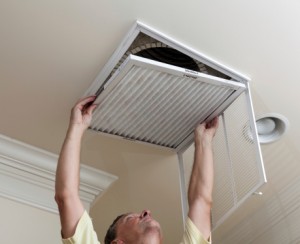Which is Better for Your HVAC System: HEPA or MERV Filters?
Know the meaning of various HEPA and MERV ratings before you buy your next HVAC filter.
 Considering how much time the average American spends indoors, having good indoor air quality is no doubt important, both for your health and for your comfort. While many factors affect air quality, filtration is definitely one of the most important. Without adequate filtration, you’ll end up with high amounts of airborne contaminants like:
Considering how much time the average American spends indoors, having good indoor air quality is no doubt important, both for your health and for your comfort. While many factors affect air quality, filtration is definitely one of the most important. Without adequate filtration, you’ll end up with high amounts of airborne contaminants like:
- Dust
- Dust mites
- Pollen
- Pet dander
- Mold
- Skin flakes
- Viruses
Of course, not all filters are created equal. Before you purchase your next HVAC filter, make sure you understand how it affects your indoor air quality and energy efficiency.
What is MERV?
Most residential HVAC filters carry MERV ratings. MERV stands for Minimum Efficiency Reporting Value. This is not to say that MERV filters are poor quality in reality they are more than adequate for the needs of most homeowners. Just be sure to remember that the higher the MERV rating, the better the filtration. A filter with a MERV rating of 13 to 16 is considered a high-ranking MERV filter and can remove up to 75 percent of all airborne particles 0.3 microns or greater from the air.
What is HEPA?
HEPA, or High Efficiency Particulate Air filters, are designed for applications where contaminants must be trapped on the first go round. For example, you wouldn’t want viruses circulating in the air in a hospital, so the facility would probably be equipped with HEPA filtration. HEPA filters can capture up to 99.7 percent of all contaminants 0.3 microns or greater using a dense mat of fibers arranged in a specific configuration. Some particles naturally adhere to the fibers when they hit, while others get trapped by the curved contours of the fibers. The remaining particles are trapped when they are forced to collide with gas molecules in the filter. This high particle capture rate comes at a cost HEPA filters present more resistance to air flow than MERV filters. This means the blower on your HVAC equipment has to work harder to push air through the filter and therefore uses more energy.
Which is Better?
In the end, the decision of which filter to get will come down to your own specific needs. In most cases, you can strike a good balance between air cleanliness and HVAC efficiency with a MERV-rated filter. Remember that the air in your home is recirculated, so the same air will pass through your filter multiple times each day. After several rounds, each of which captures up to 75 percent of airborne particles, your air will get plenty clean, without requiring the extra energy that HEPA filtration would.
